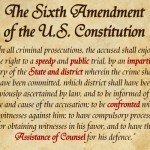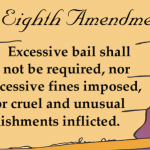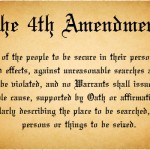Federal law provides significant penalties for felons in possession of weapons, unless the felon has his rights restored by the convicting state. Anyone who has been convicted of a felony is banned by federal law from ever possessing “any firearm or ammunition.” Specifically a person “convicted in any court of a crime punishable by imprisonment […]
The Sixth Amendment’s Right to the Assistance of Counsel
Thanks to television police reading the Miranda Warnings people are familiar with a criminal defendant’s right to an attorney and that an indigent defendant may have appointed counsel. Such protections have not always been part of United States law. The right to an attorney is found in the Constitution’s Sixth Amendment. The Sixth Amendment was ratified as part of the Bill […]
Fourth Amendment Probable Cause for a Warrantless Arrest
A police officer cannot arrest a citizen without a warrant based upon a hunch or mere suspicion. He must have “probable cause”. The US Constitution‘s Fourth Amendment[1] requires a warrant for a person or his property to be “seized” or searched by a government agent. The law has developed allowing government agents to conduct warrantless […]
The Sixth Amendment, One Amendment, Six Constitutional Rights
The Sixth Amendment contains rights beyond the well-known right to an attorney in criminal matters. There are six constitutional rights in the Sixth Amendment. They are procedural rights designed to protect an individual’s inalienable natural rights of life and liberty found in the Declaration of Independence. The Sixth Amendment is part of the Bill of Rights, […]
Eighth Amendment: Banning Cruel and Unusual Punishment
The Eighth Amendment to the US Constitution is part of the Bill of Rights. Along with the Fourth, Fifth and Sixth Amendments it recognizes procedural rights for persons accused of crimes. The purpose of these procedural rights is to protect an individual’s inalienable natural right to liberty. When originally ratified in 1791, the Bill of […]
The Exclusionary Rule in US Criminal Trials
Part of the Bill of Rights, the Fourth Amendment to the United States Constitution prohibits government searches or seizures without a warrant issued by a disinterested magistrate. The Fourth Amendment protects the right to have government stay out of a person’s home and property without prior approval by a judge. If the judge has found […]
Expunging & Sealing Florida Criminal Records
It is difficult to get a job in today’s economy, especially for an individual with a criminal record. For those with a criminal history in Florida[1] there is a process for some individuals to clean their records. For eligible individuals there are 2 potential outcomes for clearing a Florida criminal history. One is for the […]
The US Constitution and Local Government
Discussions of the US Constitution tend to focus upon the actions of the president, congress and the Supreme Court. While these are consequential, often overlooked is the impact of the Constitution on the actions of local government. Most Americans are aware of the presidential oath of office required of a new president before he begins […]
Interstate Extradition in the United States
Every State of the United States has legal authority regarding people present within its boundaries. A State does not have authority over a person present in another State. For example: If a person is wanted for a crime committed in Illinois is found in Florida, an arrest can only legally be made by Florida law […]
Fourth Amendment Origins: Court Battles Lead to Revolution
“The house of every one is to him as his castle and fortress, as well for his defence against injury and violence as for his repose.” Sir Edward Coke,[1] 1604 “They who can give up essential liberty to obtain a little temporary safety, deserve neither liberty nor safety.” Benjamin Franklin,[2] 1755 “… one of the most essential branches […]














